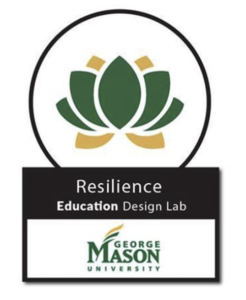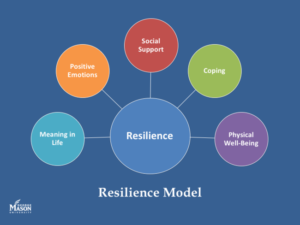Credit: Evan Cantwell/Creative Services/George Mason University
Resilience Badge
“Mason’s Resilience Badge was an inspiring workshop that pushed me to become more aware about growing and being a better person…” – A Mason student who earned the badge
George Mason University’s Resilience Badge is a fully online, asynchronous learning opportunity that has been especially designed for students and is open to all Mason students, faculty, and staff. It will allow you to further develop your resilience through content knowledge and practices, all of which are backed by the science of resilience. Deepening your own knowledge in these areas and honing your self-awareness will allow your thinking to become more flexible, more adaptable, and more creative. This will help you when it comes to solving problems, making decisions, and building the life you want.

You will have the opportunity to:
- Discover what resilience is.
- Engage resilience through a growth mindset.
- Deepen your understanding of optimism to benefit resilience.
- Explore fear in the context of resilience.
- Find ways to respond to stress from a place of resilience.
The six modules will conclude with the development of an Individual Resilience Plan that will help you to think about resilience beyond this badge experience. This plan will support you in continuing to develop your resilience and to leverage it in reaching your goals (personal, professional, and/or academic).
By successfully completing each module, you will be able to:
- Explain the benefits of resilience.
- Define what resilience means in everyday life.
- Explain how you will use resilience to further your personal and professional growth.
Enroll in the Resilience Badge, here.
If you have questions about the Resilience Badge, please contact us at: ResBadge@gmu.edu
Resilience Resources
Resilience, one tenet of Mason’s definition of well-being, is understood as the capacity for successful adaptation in the face of challenge, stress, and adversity. Through your day-to-day management of both work and non-work tasks, you are already practicing resilience, and you may be seeking more learning and growth in this area.
Here are 10 articles that each connect to one of the 10 strategies explored in Resilience: The Science of Mastering Life’s Greatest Challenges by Steven M. Southwick and Dennis S. Charney. By engaging these strategies, you will have the opportunity to deliberately strengthen your resilience by learning more about yourself. A basic building block of resilience is self-awareness, and we cannot be successful in developing our capacity for resilience without also learning about ourselves. Engage with this material by sharing it with a friend or a colleague or reflecting on your own with your journal. Schedule a virtual coffee chat with someone to discuss your reactions to the material. Share it with a group via email or text and encourage a lively exchange of ideas while maintaining the social connections that are vital to resilience. Share a link to the page in your social media feed or share with your office in preparation for an upcoming virtual meeting. We encourage you to take this material into your lives in ways that are most meaningful to you.
Here are links to all 10 Resilience Resources Weekly posts:
Strengthen Physical Well-Being
Knowing and Using Our Signature Strengths
Mason’s Resilience Model

Mason’s Resilience Model represents the components of flourishing that we believe comprise a resilient human being. Resilience is the capacity for successful adaptation in the face of stress, challenge, and adversity.
Our center believes that with the appropriate resources and support, individuals, communities, and organizations can intentionally build their resilience in each of the resilience domains. Our resilience model was developed by Mason’s Resilience Working group, a subset of individuals from the larger George Mason Well-Being University Learning Community that worked to foster resilience at Mason.
Positive emotions are a person’s brief responses when they interpret their current circumstances as good, pleasurable, or of good fortune. Positive emotions include joy, gratitude, serenity, interest, hope, pride, amusement, inspiration, awe, and love.
Social support is the degree to which a person feels they can rely on or turn to other people for support, advice, or encouragement.
Meaning in life is the extent to which a person feels their life is purposeful and how they make sense of their life and place within the world.
Coping involves a person’s response to something distressing, including their ability to manage their emotions, thoughts, and behaviors.
Physical well-being encompasses a person’s objective health (regular physical exercise, healthy diet, adequate sleep), and subjective health (how healthy they believe they are).

